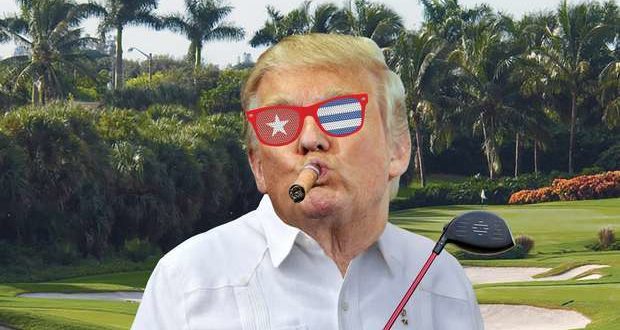
Iván García, 25 November 2016 — After sweeping a park that spans entire block in the Vibora neighborhood of Havana, Silvio sits on a wooden bench and, in the shade of a carob tree and a fresh autumn breeze, guzzles a liter of cold water.
As for many Cubans, politics aren’t his forte. He’s serving a year of detention for hitting his ex-wife, and sweeping parks or weeding flower beds is part of his punishment.
“Things in Cuba are really bad. There’s no money, and it’s very hard to buy food. At the rate we’re going, we’ll soon be starving even more than during the Special Period. I don’t know how Trump could help make things better for Cubans. These scoundrels (of the Cuban regime) are the ones that have to do that. And they don’t. They steal all the money and then entertain us with their long speeches. Trump seems like an S.O.B., but the sitution in Cuba isn’t his fault. The solution is to sell the country in an auction. Can’t that be done?” asks Silvio in the warm, morning sun.
Cubans don’t really like to make predictions. They don’t do them any good.
“They’ve deceived us so many times that people prefer to live day to day. The future seems like a fairy tale. From Fidel Castro’s unfulfilled promises to produce as much milk or meat as Holland, to a quality of life comparable to that of New York.They’ve always sold us the theory that the U.S. blockade (embargo) is responsible for Cuba’s misfortunes. Then a guy like Obama arrives at the White House, who wants to change strategies and whom Cubans on the island love, and they keep blaming their problems on the Americans. That’s why a lot of people don’t care who’s governing in Washington. The solution to our problems depends on Cuban leaders,” says Carlos, a sociologist.
Cuba is hurting. The streets are destroyed, the people are tired of speeches and slogans, low salaries and decades of shortages. To escape the daily drama, people cope by settling into a recliner or an arm chair in front of the TV for hours, watching Mexican soap operas or game shows and reality shows made in Miami.
Orlando earns a living stuffing matchboxes on 10 de Octubre Avenue. He would have liked Hillary Clinton to win the election. “Forget the story that she would have continued the Cuba policies put forth by Obama. I wanted her to win because she would have become the first woman president of the United States. I think the world is lacking in female governance.”
Although polls seem unreliable after the resounding failure of Brexit in Great Britain, peace talks in Colombia, or Trump’s unexpected victory in the United States—where citizens hid their intentions in the voting booth—in Cuba an overwhelming majority preferred Hillary in the White House.
Influenced by Trump’s bad press on the island, the continuation of Obama’s legacy, and other diverse reasons—from our mixed races to empathizing with a black head of state—the average Cuban was for Clinton.
Cubans didn’t really care about Hillary’s email scandals or the accusations made against her husband by a campaign volunteer. Nor did they care about news reports accusing the Clinton family and their political dynasty of corruption.
For Delio Benítez, who has a degree in Political Science, there’s a strange phenomenon in Cuba. “In general, when Cubans are on the island, they lean toward Democrats in the U.S. elections; but once they’re living in North America, a large portion of them vote for Republicans.”
Benítez doesn’t know why. “I can’t prove it with scientific studies. Maybe it’s the prevailing anti-imperialism in Latin America, or the aggressive discourse of the Cuban regime. But in the Cuban subconscious, Democrats are, politically speaking, more reasonable than Republicans, with their tendencies toward war and their anti-immigration stance.”
For Josuán, a vegetable and fruit seller in an open-air market in Havana, Hillary was a better option because “she may not have abolished the Cuban Adjustment Act. For me, and for many who plan to emigrate, Clinton was our candidate. Trump is going to repeal that law. And those of us who planned to leave will have to speed up our trip.”
The majority of citizens that have coffee without cream for breakfast also don’t expect a disaster from the Trump administration. “He’s a businessman. Maybe he’ll fit in better with Castro than Obama. Hillary would have been perfect, but (Cuba-U.S.) relations won’t be broken with Trump. One thing for sure, things are going to be bad for us Cubans regardless of who wins in the United States. The blame for our misfortunes lies here at home,” claims Emilio, a personal barber, in a soft voice.
If you want to meet a sector of Cubans that applaud the election of Donald Trump, please visit the dissident, Antonio Rodiles, in the Miramar neighborhood in east Havana, or Berta Soler at the Damas de Blanco headquarters in Lawton on the south end of the capital.
That branch of the opposition, under the umbrella “Forum on Rights and Freedoms,” practically held a party over Trump’s victory. According to their statements, they believe that as repressed dissidents they will get more backing and financial assistance from the White House.
But it just so happens that, in Fidel Castro’s Cuba, anyone who has survived eleven U.S. administrations had an equal chance of being imprisoned or executed during a democratic era as they did a republican era.
Autocracies thrive and survive regardless of any major or minor international condemnation. Ending autocracy is Cuba’s business. No one else’s.
Translated by: Kathy Fox
